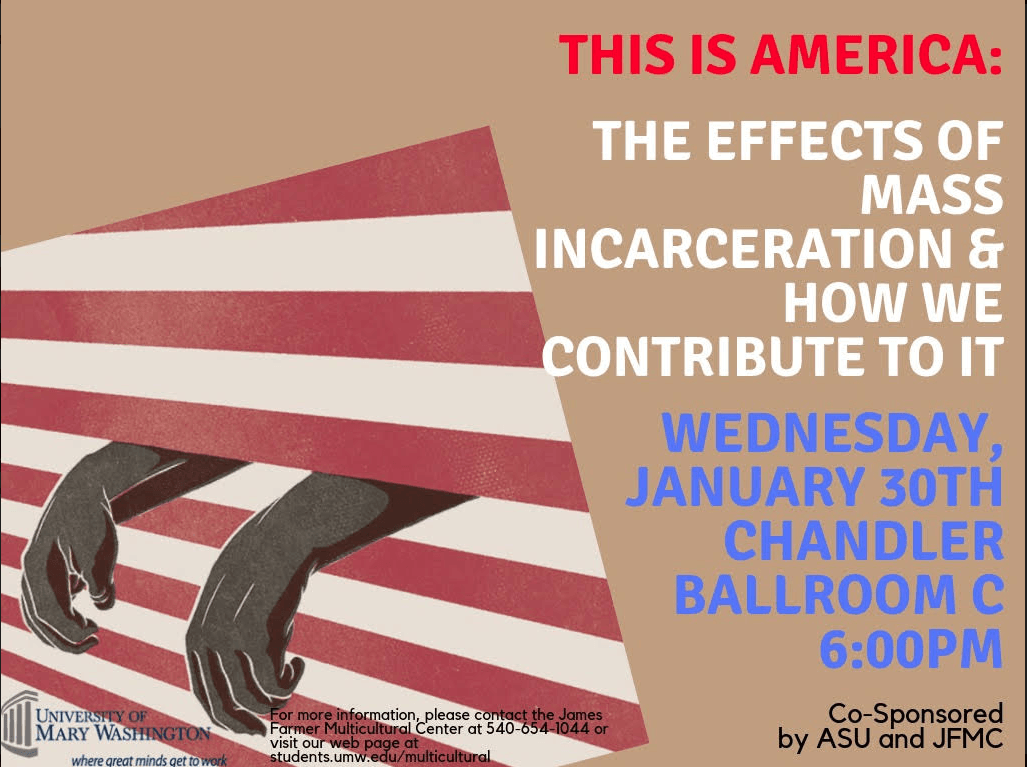Students participate in discussion about mass incarceration and UMW’s inmate-made furniture
4 min read
Mili Mehari
By AVA ROBB
Staff Writer
UMW students and members of the Fredericksburg community gathered in the Chandler Ballroom on Jan. 30 for the event “This is America: The Effects of Mass Incarceration & How We Contribute to it.” Student leaders Milen Mehari of African Student Union, Christopher Williams of the James Farmer Multicultural Center and Xan Mead from Feminists United facilitated the meeting. The event was open to all community members interested in learning more about mass incarceration in Virginia and how individuals and UMW can work together to make a positive difference.
In addition, representatives from two local organizations, Fail Safe ERA and Optimal Health Enterprise, were also in attendance. Both organizations educate and help marginalized community members overcome and reintegrate into society after incarceration.
The United States has the highest number of men, women and children in correctional institutions in the world. For an African-American male born in 2001, the likelihood of being imprisoned is 1 in 3, while the likelihood for Latino men is 1 in 6 and white men is 1 in 17. These statistics illustrate the disproportionate incarceration rates among minority communities throughout the nation.
As a discussion-based event, those in attendance had the opportunity to collaborate in individual groups about how their lives are impacted by incarceration and what steps can be taken to bring change and awareness to the community.
UMW sophomore and psychology major, Destiny Jordan, thinks more needs to be done to combat the biases towards African-Americans and minority groups both on and off campus.
“The social structure in America is created to outcast us,” she said. “Implicit bias is instilled in our community and I see it every day.”
Bringing awareness and offering a space for open and informative communication about the high rate of minority imprisonment was the goal of the event, according to Milen Mehari, senior English and gender studies major.
One of the central issues of the event was UMW’s continued purchase and use of desks, chairs and furniture produced by inmates in Virginia prisons. An informative pamphlet which senior Milen Mehari created for the discussion is quoted stating: “Incarcerated individuals working in Virginia prisons are paid 0.27 to 0.80 cents per hour.”
Virginia state law mandates that public universities acquire their furniture from Virginia Correctional Enterprises (VCE). However, UMW frequently looks for other opportunities to purchase furniture and is exempted from the requirement in special circumstances. For instance, VCE cannot always accommodate a need for interchangeability of furniture from dorm to dorm.
“We have typically received VCE releases for our residence life furniture (beds, dressers, etc.) based on need for interchangeability,” said Patricia Canciglia, senior contractor of procurement services. When possible, UMW does not use furniture from Virginia Correctional Enterprises.
According to the Virginia Correctional Enterprises website: “Inmates working for VCE in prison jobs produce goods or services for sale to state agencies and other entities within government that are supported in part or whole by funds of the Commonwealth.”
“Nowhere in the integral community values of UMW does this practice make sense,” said senior sociology major Ashton Ledbetter. “I had no idea I was sleeping on a bed made from exploited prison labor.”
Following small discussions, the meeting invited Paulette Johnson and Oliver Johnson from Optimal Health Enterprise, as well as Doug Taylor and Juanita Shanks from Fail Safe ERA to lead a conversation panel and answer questions.
One question asked from the audience was by a UMW student who wanted to know what the panel members first step would be in prison reform.
“Education,” Doug Taylor answered. “We need to help educate the community and get people involved in the cause. We need individuals to be aware of the discrimination and stigmatization that minorities face every day.”
Each panel member emphasized the importance of education and exercising individuals’ rights to vote in state and general elections. “By being an informed citizen, you can be an informed voter and make your voice heard for changes that you believe in,” said Oliver Johnson of Optimal Health Enterprise.
“It is important to get to know those around you and be a part of the community in which you engage with all the time,” said senior international business major Kelcie Macomber. “We don’t always know how people are impacted by our words and actions and that is something to be more aware of.”
At the end of the event, attendants were encouraged to do further research on their own. Recommended texts included “The New Jim Crow” by Michelle Alexander and “Just Mercy” by social activist Bryan Stevenson. In addition, the Netflix documentary “13th” was on the list as a source for more information about prison reform.


